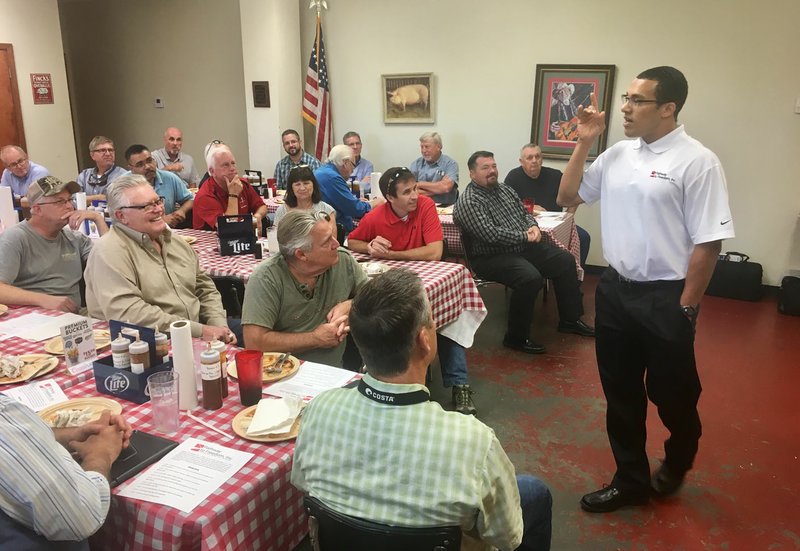BENTONVILLE -- Good intentions aren't enough to push someone's life in a new direction after prison, advocates and former inmates said Thursday.
A new life also needs deep-rooted commitment from that person and from others in the community, said members and supporters of the Pathway to Freedom nonprofit, which offers a Christian-focused re-entry program for Arkansas Department of Correction inmates. A recent graduate of the program was featured at the group's semiannual fundraising luncheon.
TJ West said he served 10 years for robbery and other charges, and was released about two months ago after finishing the 18-month portion of the program that takes place behind bars in Wrightsville. Pathway to Freedom offers anger management and parenting courses, as well as new ways of thinking, and members hold each other accountable, he said.
After release, Pathway to Freedom provides a year of support finding housing, jobs and getting participants in touch with mentors and other volunteers, often through churches. West is now an outreach intern with the group, has a driver's license and pays rent and taxes, he announced half-jokingly but proudly.
"Now I'm an effective father, for once in my life," he told the group, thanking the volunteers and contributors and urging a few newcomers to get involved with re-entry efforts. Nearly all inmates will return to their communities. The question for those communities, he said, is this: "How do you want us back?"
Arkansas has struggled for years with overfull jails and prisons and high recidivism rates. More than 50 percent of released inmates return to prison within three years, according to the Department of Correction.
Gov. Asa Hutchinson and other state officials have pushed for more re-entry programs, with the goal of helping former prisoners build normal lives and avoid surroundings or situations that can draw them back into crime. Hutchinson in 2015 put $5.5 million toward private re-entry housing centers under the Community Correction Department, for example, and more money to beef up parole staff.
Pathway to Freedom contracts with the Department of Correction but isn't paid by the state, given its religious focus. Instead the state provides the facility and food at its J. A. Hawkins Unit, which can hold 200 men.
Walter E. Hussman Jr., the Northwest Arkansas Democrat-Gazette's publisher, is a member of Pathway to Freedom's board.
About 85 percent of about 120 graduates so far have stayed out of prison since their release, though not all have been out for the three-year period of recidivism rates, Pathway to Freedom Director Scott McLean said earlier this year.
"Just building prisons is not the answer," said Joe Bruton, re-entry specialist for the Northwest Arkansas area and himself a Pathway to Freedom participant eight years ago. About 30 participants are from Northwest Arkansas, 15 have been released and are in the second part of the program and 20 graduates still stay in touch, he said.
"We build a community of support in there for them, and then we emulate it outside," he added.
Bruton and West credited that community and God for their success. West said at first he hoped only that the program might help him get parole earlier. But the spiritual, psychological and practical help it gave turned out to be "so much more than I could have ever thought," he said.
Participants don't need to be Christian, but the focus on Jesus Christ makes the program unique and effective, McLean said.
"We've got to do things differently than they've been done" to solve recidivism and overcrowding, he said.
Dina Tyler, a deputy director at Arkansas Community Correction, said Pathway to Freedom's model of getting community volunteers involved is critical. Pathway to Freedom doesn't fall under the department, but the department runs parole programs and re-entry centers, which often face pushback from some nearby residents, she said.
Solomon Graves, spokesman for the Department of Correction, wasn't available for comment Thursday afternoon.
"There are offenders in your community anyway," Tyler said, and helping them get regular jobs and lives keeps everyone safer. "We have to have more mentorship, and we have to have more community involvement -- we just do."
NW News on 08/04/2017

